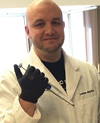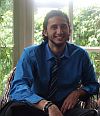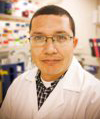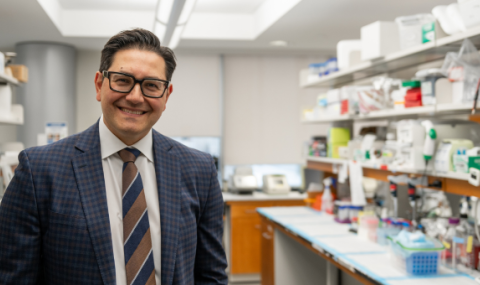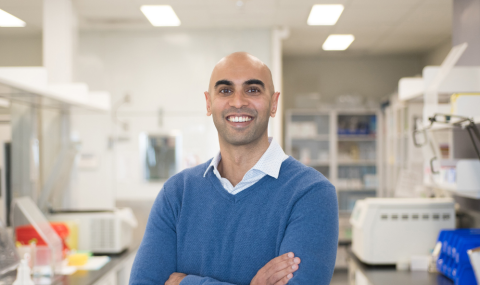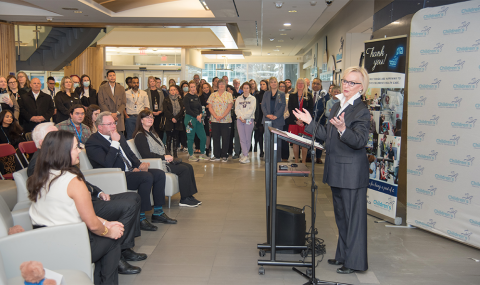Yonathan Araya is a PhD student in the Department of Medical Biophysics, under the supervision of Dr. Timothy Scholl. Yonathan is currently investigating the uptake, penetration, homogeneity, and distribution of serum albumin in breast cancer tumours. The particular protein he is investigating has been shown as a marker in breast cancer tumours. Using a novel magnetic resonance field-cycling imaging method and the targetable contrast agent Albavar, he will evaluate albumin trafficking to improve early detection of aggressive breast cancer phenotypes. This novel imaging method will improve current clinical limitations for protein based MR imaging. |
|
Omar El-Sherif is a PhD student in the Department of Medical Biophysics, under the supervision of Dr. Stewart Gaede. Their work focuses specifically on left-sided breast cancer radiation therapy treatment planning. In the case of left-sided breast cancer radiation treatment, the motion of the heart caused by respiration can lead to significant heart irradiation during treatment. Radiation-induced toxicity of the heart may lead to an increased risk of cardiovascular disease later in a patient's life. Their research goal is to develop radiation therapy treatment plans that incorporate each patient's specific breathing pattern in an attempt to minimize radiation to the heart. |
|
Alexandra Hauser-Kawaguchi is a PhD student in the Department of Chemistry, under the supervision of Dr. Len Luyt. RHAMM, a receptor they are studying, has been linked with the progression of a number of cancers and found toinitiate and promote breast cancer. High expression is associated with poor prognosis, metastasis, and relapse of the disease. Because biological synthesis of RHAMM is difficult, they have chemically synthesized a shortened version of the receptor; its characterization shows that it is a suitable replacement receptor against which peptide ligands that they discover can be screened. They use surface plasmon resonance (SPR) to study these biomolecular interactions in order to identify novel compounds that have the potential to be peptide-based therapeutic agents for the treatment of breast cancer. |
|
Jenna Kara is an MSc student in the Department of Medical Biophysics, under the supervision of Dr. Dwayne Jackson and Dr. Paula Foster. Some patients develop metastases several years after breast cancer remission. Re-activation of dormant cells induced by stress may explain the prolonged period between treatment and relapse in many cases. Previous research from their lab illustrates that neuropeptide Y (NPY), a substance released from nerves during stress, promotes tumour progression. Jenna’s research seeks to understand the role of the neuropeptide Y (NPY)- neuropeptide Y5 receptor (Y5R) system in cancer recurrence. |
|
Sami Khan is an MSc student in the Department of Anatomy and Cell Biology, under the supervision of Dr. Alison Allan. Their lab has identified a small subset of breast cancer cells (ALDHhi CD44+ phenotype) that show an enhanced ability to spread to the lung, through a process known as metastasis. Unfortunately, metastasis is incurable with currently available treatments and is responsible for the majority of breast cancer patient deaths. Sami’s project aims to determine which lung-specific factors are involved in breast cancer cell migration to the lung and to assess the potential of these factors to become novel targets for the treatment and prevention of breast cancer metastasis. |
|
Bart Kolendowski is a PhD student working under the supervision of Dr.Torchia at the London Regional Cancer Program and is in the department of Biochemistry at Western University. His work focuses on the estrogen receptor (ER) which is a hormone receptor that is expressed in most breast cancers and is the target of certain breast cancer therapies, including tamoxifen. Understanding how the ER drives tumour growth is paramount in understanding how endocrine therapies work and what happens when they fail. Bart is using global genome-wide approaches to identify long noncoding RNAs (lncRNA) which are regulated by ER and may represent novel driving factors in breast cancer. By investigating the role of ER in regulating the production of these lncRNA, Bart plans on furthering our understanding of why hormonal therapies fail while at the same time developing a targeted therapy approach for breast cancer.
|
|
|
Ivan Kosik is a PhD student in the Department of Medical Biophysics, under the supervision of Dr. Jeffrey Carson. Lumpectomy surgery, also called breast conserving surgery, is recommended for women diagnosed with early breast cancer; however, about 1 in 5 procedures will fail to completely remove all cancer making a second surgery necessary. This situation, resulting from a lack of rapid and specific tumour imaging technology, strains both patients and resources. Photoacoustic Imaging (PAI) shows great promise as a diagnostic tool for cancer detection because it is able to safely and rapidly visualize properties of tissue which distinguish normal from cancerous lesions. Ivan and Dr. Carson have developed a unique PAI system specifically geared towards imaging surgical samples. Their aim is to use this system to assemble a statistical database linking imaging results to histological findings and re-excision surgery rates. The hope is that this information will eventually establish a new surgical protocol leading to lower repeat-surgery rates, and hence alleviating unnecessary discomfort for patients and monetary cost on hospital resources. |
Milica Krstic is a PhD student in the Department of Pathology, under the supervision of Dr. Alan Tuck and Dr. Ann Chambers. Her project examines the mechanistic role of transcription factor TBX3 in the “malignant conversion” of breast cancer cells. Conversion of breast cancer from a non-invasive to invasive type is associated with morbidity and mortality of the disease, and remains the greatest concern for patients. She will also quantify expression of TBX3 in clinical samples of premalignant vs. early invasive stage breast cancer. This work will help to determine if TBX3 can predict which premalignant lesions of the breast are most likely to progress, allowing us to stratify patients into high-risk and low-risk groups, which could potentially affect subsequent treatment strategies. Additionally, this work has the potential to identify new targets for breast cancer therapy, hence preventing metastasis. |
|
Xuguang Liu is a PhD student in the Department of Biochemistry, under the supervision of Dr. Shawn Li. His project focuses on using engineered SH2 monobodies to inhibit specific ErbB signaling pathways. Extremely high activity of ErbB protein and subsequent abnormal signaling pathways is a main cause of HER2 breast cancer. In Li’s lab, the natural ErbB binding partner SH2 is engineered to create an ErbB superbinder, and preliminary work reveals the potential to further modify this superbinder to block specific regions in ErbB protein coupling with cancer-relevant signaling pathways. |
|
Ashley Makela is an MSc student working under the supervision of Dr. Paula Foster in the Department of Medical Biophysics. Tumour associated macrophages (TAMs) are cells within the tumour which have been shown to help the tumour grow and allow the cancer to spread to other sites in the body (metastasize); their presence is associated with a poor prognosis in the majority of breast cancer cases. These cells can be detected and monitored by utilizing high-resolution magnetic resonance imaging (MRI) methods along with cell labeling agents. This research may produce important information about the influence of TAMs on tumour growth and metastatic spread and give insight on how to use this information to aid in detection, prognosis and treatment evaluation. |
|
Matthew Mouawad is a PhD Student in the Department of Medical Biophysics, under the supervision of Dr. Stewart Gaede and Dr. Neil Gelman. His work will contribute to the development and optimization of a proposed new treatment plan for early stage breast cancer using a single treatment of radiation prior to lumpectomy instead of the current standard of care which is whole breast radiotherapy following surgery. This proposed treatment has the potential to drastically improve the quality of life for breast cancer patients by reducing radiotherapy treatment time from several weeks to a single session. Using the only imaging system in Canada that combines the functionality of PET and MRI, he will assess the potential of this imaging system to evaluate patient tumor response to radiation. This research will lead to the development of tools to help clinicians to tailor treatment regiments to individual patients.
|
|
Donna Murrell is a PhD student in the Department of Medical Biophysics, under the supervision of Dr. Paula Foster. Her project involves the use of advanced MRI techniques to study the permeability of the BBB (blood-brain-barrier) in breast cancer metastasis to the brain. It is thought that impermeability of the BBB hinders the delivery of therapeutic agents to brain tumours and causes many chemo and molecular treatment options to be ineffective. By identifying what influences metastatic tumour growth and permeability in the brain, the hope is to advance the development of treatments for brain tumours.
|
|
Katie Parkins is an MSc student in the Department of Medical Biophysics, under the supervision of Dr. Paula Foster and Dr. John Ronald. Her project involves the use of molecular imaging techniques to determine if the presence of a primary breast cancer tumour can suppress the development of brain metastases by inducing tumour cell dormancy. Understanding the mechanism(s) by which this physiological inhibition of metastatic outgrowth can occur may lead to new therapeutic approaches to enhance dormancy or maintain dormant cancer in a nonproliferative state. |
|
Mauricio Rodriguez-Torres is a PhD student in the Department of Anatomy and Cell Biology, under the supervision of Dr. Alison Allan. Metastatic breast cancer cells do not thrive in all organs, but instead show preference for migrating to and growing in specific organs including lymph node, lung, liver, brain, and bone. Our recent studies indicate that breast cancer cells with both high activity of aldehyde dehydrogenase (ALDH) enzyme and high expression of the cell-surface protein CD44 show organ-specific metastatic behaviour in addition to therapy resistance and increased capacity to initiate and sustain tumour growth, making these cells potential therapeutic targets. Mauricio’s research is focused on establishing the role of ALDH, CD44, and other related tumour cell-derived mechanisms underlying organ-specific metastatic preferences of breast cancer cells. |
|
Ashkan Sadri is an MSc student in the department of Anatomy and Cell Biology, under the supervision of Dr. Allison Allan. Despite rigorous research revolving around the topic, breast cancer still remains a leading cause of cancer-related death amongst Canadian women. The primary factor is metastasis, as current therapies are largely non-curative in the metastatic setting. Ashkan and Dr. Allan’s novel study aims to identify key factors involved in metastasis towards the lung microenvironment, since this particular tissue is one of the most common and fatal sites of breast cancer dissemination. Understanding the intra- and extracellular communication that is constantly ongoing in this microenvironment during metastasis will be directly translational in a clinical setting and potentially support future therapeutic strategies to overcome breast cancer. |
|
Camilla Urbaniak is a PhD student in the Department of Microbiology and Immunology, working under the supervision of Dr. Gregor Reid. The bacteria that are naturally found in our bodies have been shown to play an important role in many diseases that have been on the rise in the last 20 years. Camilla and Dr. Reid believe that the same holds true for breast cancer and that certain bacteria may promote cancer while others may prevent it. By identifying and isolating the bacteria found in cancerous and non-cancerous breast tissue and breast exudates, they will have a better understanding of the mechanisms by which bacteria can influence breast cancer. |
|
Tahereh Vakili is an MSc student in the Department of Biochemistry, under the supervision of Dr. Eva Turley. Recent experiments in the lab have identified a new type of tumour cells that may be responsible for the re-growth and spread of tumours following chemotherapy. She is interested in studying whether some clinically routine chemotherapeutic regiments that have been proven to kill breast cancer cells have the ability to attack and eliminate these newly identified tumour cells. This study can be beneficial for designing new therapies that prevent disease recurrence and prolong patient survival. |
|
Lawrence Yip is an MSc student in the Department of Medical Biophysics, under the supervision of Dr. Jeffrey Carson. He is working on developing a photoacoustic imaging system, which is a hybrid system combining the advantages of ultrasound and optical imaging. With this system, he hopes to assist in breast-conserving surgery to more accurately remove tumourous tissue and reduce repeat surgeries.
|






